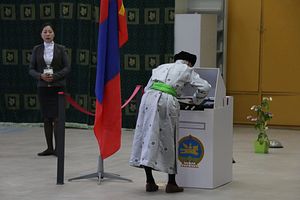The results are in from the June 29 vote and the opposition Mongolian People’s Party (MPP) handed a resounding defeat to the Democratic Party (DP).
Mongolians sent a clear message to their government by electing 65 members of the Mongolian People’s Party to the 76 parliamentary seats in the State Great Khural. Voters across the nation elected only nine Democratic Party candidates—a major drop from its current 37 MPs—and a single independent politician into office.
The MPP’s super-majority, a massive 85 percent, has been interpreted as a repudiation of the ruling DP’s leadership. Prime Minister Chimed Saikhanbileg and the parliamentary chairman, Zandaakhuu Enkhbold, both lost their seats.
The economy appears to be a significant factor in the MPP’s landslide victory. Mongolia is currently experiencing a profound economic downturn, due in large part to waning demand for its exports from neighboring China. The global drop in prices for copper and coal contributed to this year’s IMF projection of a measly 0.4 percent GDP growth for Mongolia in 2016. The majority Democratic Party has been widely blamed for mishandling the economy after a boom from 2010 to 2012 quickly turned to bust on their watch.
The recent approval by global mining conglomerate Rio Tinto of a $5.3 billion extension to its Oyu Tolgoi copper mine, and a last-minute announcement by prime minister of a private Mongolian company’s purchase of a 49 percent stake in the Erdenet copper mine, did little to convince voters that the DP could maneuver a way out of the slump.
Reuters reported that following the elections, Mongolian government bonds spiked. It remains unclear how the election results will influence the country’s credit rating, which Moody’s assessed as a B2, with a negative outlook, in January this year.
However, some analysts are doubtful the sweeping political reversal will yield substantial shifts in policy. Julian Dierkes, expert on Mongolian politics and professor at the University of British Colombia, said in his post-election analysis: “The MPP campaign did not suggest that any major policy changes are coming. Given the enormous public debt amassed by previous governments, the state budget doesn’t leave much room for any major initiatives.”
Independent observers from the OSCE and the European Parliament released a preliminary report on their findings related to the election. In it, the mission found that “election day was orderly following a competitive campaign.” However, the statement said that this “did not offset the impact of late fundamental changes in the electoral legislation on Mongolia’s democratic development.”
In May 2016, the Mongolian parliament changed the electoral system from a mixed representative system to a purely majoritarian one, which was widely criticized as a move to prevent non-major parties from securing seats. The OSCE also condemned the move for its establishment of new geographic boundaries for constituencies in a “process that lacked transparency, public consultation and adherence to established criteria.”
“We applaud the fact that Mongolia is a functioning democracy” said Laima Liucija Andrikiene, head of the European Parliament delegation, before adding that “there were, however, some elements which cause concern, including significant last-minute changes to the election laws.” The law also prevented an estimated 150,000 Mongolian citizens living abroad, including diplomats, from voting.
Apart from the MPP headquarters in Ulaanbaatar, where celebrations ensued as the results were announced, the streets were relatively quiet into the early hours of the morning of June 30. The mayor of the capital city recently banned public demonstrations and celebrations until July 17 out of security concerns. As The Diplomat reported, tensions were high before the polling out of fears of a replay of the violent 2008 post-election protests, which left five dead.

































